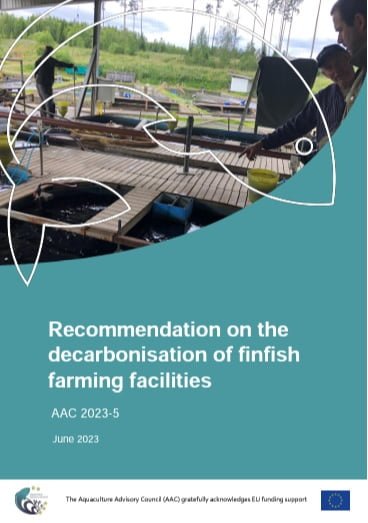
The Aquaculture Advisory Council (AAC) has issued a set of recommendations for the European Commission and Member States to support the efforts of the European aquaculture sector in improving energy efficiency in production facilities and transitioning to renewable and low-carbon sources of electricity.
This can be achieved through the integration of innovative smart technologies and control systems to optimize energy use efficiency, taking advantage of the technological advancements offered by European technology providers to the aquaculture sector.
Furthermore, the AAC emphasizes that European authorities must take into account that the capacity for the necessary changes to decarbonize the fish farming sector is directly linked to its economic conditions, which have been worsened by the Covid-19 crisis, Russia’s invasion of Ukraine, and inflation.
On the other hand, the AAC points out that consumers must play an important role in driving market forces towards the production of low-carbon foods. Therefore, efforts to ensure that consumers are informed when choosing foods with different carbon footprints are essential.
Recommendations
a) Establish EU-wide mechanisms to reduce the cost of electricity from renewable and low-carbon sources, as well as its price volatility.
b) Fund research and technology to meet the specific energy transition requirements of finfish aquaculture farms, including efficiency improvements and new systems.
c) Assess and communicate to aquaculture stakeholders how decarbonisation efforts in finfish farming can be linked to other general European objectives, such as food security, increased organic aquaculture production and nature restoration.
d) The European Commission (DG MARE) should use the Aquaculture Assistance Mechanism to identify and share positive experiences of energy efficiency investments and the use of renewable and low-carbon energy in finfish aquaculture across Member States, including benchmarking indicators and performance monitoring to facilitate and encourage progress.
e) Request Member States to take decarbonisation into consideration in the spatial planning of finfish farms, especially the distance between the sites provided to offshore marine farms and the harbours at which they operate.
f) Encourage and enable consumers to make responsible choices by purchasing finfish aquaculture products with smaller carbon footprints.
g) Member States should provide aquaculture farmers with maximum financial support through the European Maritime, Fisheries and Aquaculture Fund (EMFAF) to promote the decarbonisation of finfish facilities through both the purchase of equipment with a carbon-neutral balance and the decarbonisation of currently operating systems.
h) The AAC urges the Commission to identify environmental indicators and voluntary targets for environmental performance including a reference method to determine the carbon footprint and the environmental impact of aquaculture production, as stipulated in the strategic guidelines for a more sustainable and competitive EU aquaculture for the period 2021- 2027.
Reference (open access)
AAC. 2023. Recommendation on the decarbonisation of finfish farming facilities AAC 2023-5, 7 p.
Editor at the digital magazine AquaHoy. He holds a degree in Aquaculture Biology from the National University of Santa (UNS) and a Master’s degree in Science and Innovation Management from the Polytechnic University of Valencia, with postgraduate diplomas in Business Innovation and Innovation Management. He possesses extensive experience in the aquaculture and fisheries sector, having led the Fisheries Innovation Unit of the National Program for Innovation in Fisheries and Aquaculture (PNIPA). He has served as a senior consultant in technology watch, an innovation project formulator and advisor, and a lecturer at UNS. He is a member of the Peruvian College of Biologists and was recognized by the World Aquaculture Society (WAS) in 2016 for his contribution to aquaculture.
